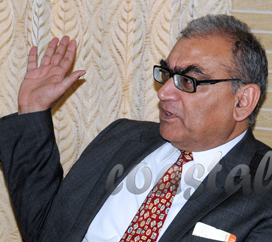 Mumbai, Mar 31: Slamming anti-corruption crusaders, judicial activism, caste-based voting, former Supreme Court justice and press council chairman Markandey Katju tackled everything from Anna Hazare and Arvind Kejriwal’s activism against corruption, to India’s place in the world and its moral code at a talk on Saturday.
Mumbai, Mar 31: Slamming anti-corruption crusaders, judicial activism, caste-based voting, former Supreme Court justice and press council chairman Markandey Katju tackled everything from Anna Hazare and Arvind Kejriwal’s activism against corruption, to India’s place in the world and its moral code at a talk on Saturday.
Speaking at the inaugural Justice MC Chagla Memorial Lecture at Mumbai university, Fort, he said the country was lacking a moral code because the old one was being destroyed but a new code was yet to replace it as the country moved from a feudal society to an industrial one.
He said this “transitional phase” would take 20 years.
“When an industrial code is in place, then corruption will come down, till then you will have corruption,” he said in the question-answer session. “Anna Hazare may shout, but has corruption gone down 1%? Shouting and screaming means nothing.”
He also took on Aam Aadmi Party founder Arvind Kejriwal, saying: “Which caste does your party represent? People vote by caste; 90% of people cast their votes like sheep and cattle… this is how educated people behave… we are a very, very backward country. The only way out is to propagate scientific thinking.”
Calling poverty the root of India’s problems, he said the West looked down on the country because of it. “We aren’t respected because our country is poor. Westerners won’t respect you unless India becomes a modern, industrialised, powerful state,” he said. “We are 20 times larger in land and population [than France or Britain] but we still do not have a permanent seat in the [United Nations] Security Council. Why? Because you are poor.”
Katju also attacked judicial activism, which he has previously criticised. “To delegate powers to judges to solve societal problems is a superficial approach and I don’t think it will yield any result.”





Comments
Add new comment